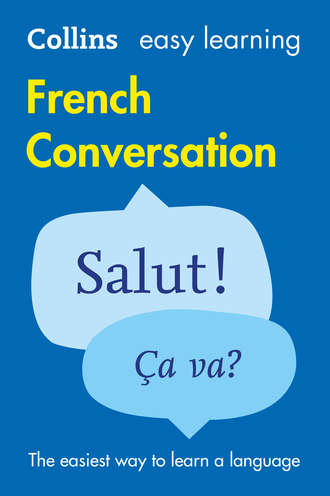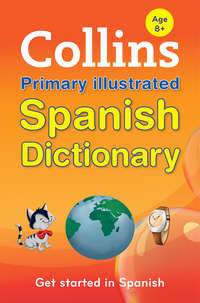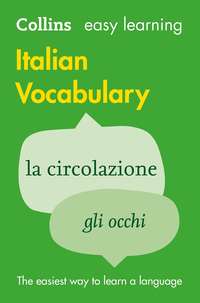
Полная версия
Easy Learning French Conversation
GREETINGS
Just as in English, there are several ways of greeting people in French, depending on who you are addressing, and whether you want to be formal or not. Say bonjour, madame/mademoiselle/monsieur if you want to sound polite and just bonjour to someone you know a little. If you’re on friendly terms with someone, you can say salut! (hi!).
Hello…
Bonjour.Hello.Bonjour, madame.Good morning.Bonjour, Pierre.Good afternoon Pierre.Salut, Olivier!Hi Olivier!Bonsoir.Good evening.BON À SAVOIR!
In French there is no equivalent for good morning and good afternoon – people just say bonjour during the day or bonsoir in the evening.
Use au revoir, madame/mademoiselle/monsieur to say goodbye to people you don’t know well. You can just say au revoir to people you know, or use salut! (bye!) if you are on friendly terms with them.
Goodbye…
Au revoir, monsieur.Goodbye.Au revoir, mademoiselle.Goodbye.Salut!Bye!Bonsoir.Goodnight.See you…
À plus tard!See you later!À demain!See you tomorrow!À lundi!See you on Monday!INTRODUCING PEOPLE
You may want to introduce people you know to one another. The simplest way is by saying voici (this is) when introducing a person. You can also use je te présente (I’d like you to meet) when addressing someone you know well, or je vous présente to be more formal or when speaking to several people.
This is…
Voici mon mari, Richard.This is my husband, Richard.Voici mes enfants: Andrew, Gordon et Emma.These are my children, Andrew, Gordon and Emma.Je vous présente Danielle.I’d like you to meet Danielle.Je te présente Kevin, mon compagnon.I’d like you to meet Kevin, my partner.BON À SAVOIR!
When you’re introduced to someone, you’ll want to know how to react. The traditional enchanté should only be used in formal or business situations these days, and very often people just say bonjour.
TALKING ABOUT YOURSELF
In order to get the conversation going, you’ll want to be able to talk about yourself – what your name is, what you do and so on. To say what your name is in French, you use the verb s’appeler which literally means to call oneself. The s’ (oneself) changes to m’ (myself) in je m’appelle (my name is). For more information on reflexive verbs like s’appeler, see here.
My name is…
Je m’appelle Jean-Pierre Métayer.My name is Jean-Pierre Métayer.Je m’appelle Tarik.My name is Tarik.Il s’appelle André.His name is André.Elle s’appelle Lara.Her name is Lara.Vous vous appelez comment?What’s your name?Moi, c’est Liam.Hi, I’m Liam.If you want to say how old you are, use j’ai followed by your age and ans (literally I have… years). ai comes from the verb avoir. For more information on avoir, see here.
I’m…years old
J’ai trente-sept ans.I’m thirty-seven years old.J’ai vingt-deux ans.I’m twenty-two.Mon fils a huit ans.My son’s eight.Vous avez quel âge?How old are you?BON À SAVOIR!
If you have to ask Vous avez quel âge?, you can always add sans indiscrétion (if you don’t mind my asking).
To talk about who you are and what you do, use je suis (I am). This comes from the verb être. For more information on être, see here.
Je suis une amie de Paul.I’m a friend of Paul’s.Je suis le frère de Ben.I’m Ben’s brother.Je suis célibataire.I’m single.Je travaille en tant que programmeur pour l’entreprise Dunier.I work as a programmer for the Dunier company.Je suis enseignant.I’m a teacher.BON À SAVOIR!
When you say what you do in French, you don’t put an article in front of the job name: I’m a baker is je suis boulanger. However, you do need an article when you address someone by their title, so Mrs Chairwoman is Madame la Directrice.
I have…
J’ai deux sœurs.I have two sisters.J’ai un fils et une fille.I have one son and one daughter.On a de la famille dans le sud de la France.We have relatives in southern France.Elle a les yeux bleus.She has blue eyes.Il a les cheveux châtain.He has brown hair.I live…
Je vis au pays de Galles.I live in Wales.Je vis seul.I live alone.On habite dans un appartement.We live in a flat.BON À SAVOIR!
If you’re female, you’ll say seule (alone) rather than seul.
I’m staying…
Je suis descendu à l’hôtel du Palais.I’m staying at the Palace Hotel.Vous êtes descendu à quel hôtel?Which hotel are you staying at?Je suis à Paris pour une semaine.I’m staying in Paris for a week.Je loge chez des amis.I’m staying with friends.To say that you’ve done something for a given length of time, use ça fait… followed by a time word such as jour (day), semaine (week) or an (year) and the verb in the present tense. For more information on the present tense, see here.
I have…for…
Ça fait cinq ans que je suis infirmière.I’ve been a nurse for five years.Ça fait dix ans que je vis en France.I’ve lived in France for ten years.Je suis à Saint-Raphaël depuis deux semaines.I’ve been in Saint-Raphaël for two weeks.J’apprends le français depuis 6 mois.I’ve been learning French for 6 months.ASKING FOR INFORMATION
When you’re chatting socially, you will want to ask any number of questions. One simple way of finding out information from someone is to say parlez-moi (tell me) to someone you don’t know very well or parle-moi to someone you’re on friendly terms with.
Tell me…
Parlez-moi de votre famille.Tell me about your family.Parlez-moi un peu de vous.Tell me a bit about yourself.Parle-moi de ton nouveau copain.Tell me about your new boyfriend.Dis-moi en quoi consiste ton boulot.Tell me what your job involves.Another handy way of asking for information in spoken French is to put c’est at the beginning of the sentence before the question word: quoi (what), où (where), quand (when) and so on.
What…?
C’est quoi ton adresse?What’s your address?C’est quoi le numéro de téléphone d’Olivier?What’s Olivier’s phone number?Qu’est-ce que tu fais dans la vie?What do you do?À quoi elle ressemble?What does she look like?Where…?
Où est votre bureau?Where is your office?C’est où cette soirée?Where is the party being held?Où est-ce que tu travailles?Where do you work?Où est-ce que tu habites?Where do you live?Tu viens d’où?Where do you come from?Tu loges où?Where are you staying?When…?
C’est quand ton anniversaire?When is your birthday?Quand est-ce que tu arrives?When will you be here?Quand est-ce que Laurent doit arriver?When is Laurent supposed to get here?Quand est-ce que James vient nous rendre visite?When is James coming to visit us?À quelle heure on se retrouve?What time are we meeting?If you want to ask how long someone has been doing something, use Ça fait longtemps que…? (How long have you…?) followed by the present tense. For more information on the present tense, see here.
How long have…?
Ça fait longtemps que tu es en France?How long have you been in France?Ça fait longtemps que tu travailles ici?How long have you been working here?Ça fait longtemps que vous attendez?How long have you been waiting?A very versatile way of asking someone socially how something is going or has gone is to use Ça se passe bien,…? (How is…?) or Ça s’est bien passé,…? (How was…?).
How…?
Ça s’est bien passé, tes vacances?How was your holiday?Ça s’est bien passé, votre vol?How was your flight?Ça se passe bien, à l’université?How’s university going?Sometimes you’ll want to ask why a friend or acquaintance did or didn’t do something. You can use Pourquoi…? (Why…?) and the past tense to ask. For more information on the past tense, see here.
Why…?
Pourquoi est-ce que tu ne m’as pas téléphoné?Why didn’t you call me?Pourquoi est-ce que tu n’y es pas allé?Why didn’t you go?Pourquoi est-ce que tu as déménagé?Why did you move house?Pourquoi est-ce qu’elle a démissionné?Why did she quit her job?SAYING WHAT YOU WANT TO DO
When you’re talking to friends or colleagues you will often need to be able to talk about what you would like to do. To say what you want to do, use je voudrais (I’d like). voudrais comes from the verb vouloir. For more information on vouloir, see here.
I’d like to…
Je voudrais te remercier de m’avoir aidé.I’d like to thank you for helping me.Je voudrais parler à M. Gautier, s’il vous plaît.I’d like to speak to Mr Gautier, please.On voudrait t’inviter à prendre un verre.We’d like to take you out for a drink.On voudrait te présenter un ami.We’d like you to meet a friend.You can also use je veux (I want) to talk about what you want to do. If you want to say that you want someone to do something, you use je veux que followed by the subjunctive. For more information on the subjunctive, see here.
I want to…
Je veux organiser une soirée surprise.I want to organize a surprise party.Je veux inviter quelques amis pour mon anniversaire.I want to have a few friends over for my birthday.Je veux que tu viennes avec moi.I want you to come with me.Je veux que la soirée soit réussie.I want the evening to be a success.MAKING SUGGESTIONS
One easy way of making suggestions to your friends and colleagues is to use on pourrait (we could) followed by the verb in the infinitive. pourrait comes from the verb pouvoir. For more information on pouvoir, see here.
We could…
On pourrait demander à Paul de se joindre à nous.We could ask Paul to join us.On pourrait se voir à un autre moment.We could meet another time.On pourrait prendre un verre un de ces jours.We could go out for a drink some time.On pourrait se retrouver au Café de la Poste.We could meet up at the Café de la Poste.Just as in English you can make a suggestion by simply asking Pourquoi ne… pas? (Why don’t…?). You will notice that French speakers very often omit ne to make sentences shorter – this is mainly in spoken French.
Why don’t…?
Pourquoi ne pas se donner rendez-vous un de ces jours?Why don’t we get together sometime?Pourquoi pas inviter Fabien et sa copine?Why don’t we invite Fabien and his girlfriend?Pourquoi pas déjeuner avec moi?Why don’t you meet me for lunch?Pourquoi tu ne les appelles pas?Why don’t you phone them?You can also make a suggestion using the French phrase Et si…? (How about?) which is followed by a verb in the imperfect tense. For more information on the imperfect tense, see here.
How about…?
Et si on les invitait à dîner?How about asking them round for dinner?Et si tu venais avec nous?How about if you came with us?Et si je passais te prendre le matin?How about if I picked you up in the morning?Use Est-ce que je devrais…? (Should I…?) followed by the verb in the infinitive to ask if you should do something. devrais comes from the verb devoir. For more information on devoir, see here.
Should I…?
Est-ce que je devrais inviter Anna?Should I invite Anna?Est-ce que je devrais la rappeler?Should I call her back?Est-ce qu’on devrait aller dans un restaurant italien?Should we go to an Italian restaurant?EXPRESSING OPINIONS
When talking to people in a social or work situation, you may wish to express your opinion of something. In French you can use je crois or je pense (I think). When you use croire and penser with a negative, as in je ne pense pas que or je ne crois pas que, the verb which follows is in the subjunctive. For more information on the subjunctive, see here.
I think…
Je pense que Sonia a raison.I think Sonia’s right.Je pense vraiment qu’il est trop tard pour aller au cinéma.I really think it’s too late to go to the cinema.Je pense qu’on devrait partir à minuit.I think we should leave at midnight.Je ne pense pas que ça soit le cas du tout.I don’t think that’s the case at all.Je crois que c’est une excellente idée.I think it’s a great idea.BON À SAVOIR!
Don’t forget to add que (that) after croire and penser. It’s optional in English, but not in French.
In my opinion…
À mon avis, c’est une bonne proposition.In my opinion, it’s a good suggestion.À mon avis, ça va poser des problèmes.In my opinion, it’s going to cause problems.À mon avis, ce n’est pas vrai.In my opinion, it’s not true.À mon avis, c’est un bon employeur, cette société.In my opinion, it’s a great company to work for.If you want to ask other people what they think of something, use Qu’est-ce que tu penses de…? (What do you think of…?).
What do you think of…?
Qu’est-ce que tu penses de son dernier film?What do you think of his latest movie?Qu’est-ce que tu penses de cette idée?What do you think of this idea?Qu’est-ce que vous diriez de sortir dîner ce soir?What do you think about going out for dinner tonight?Qu’est-ce que vous en pensez?What do you think?To agree or disagree with what other people say, use je suis d’accord or je ne suis pas d’accord.
I agree…
Je suis d’accord.I agree.Je suis d’accord avec Nigel.I agree with Nigel.Je ne suis pas d’accord avec cette décision.I don’t agree with this decision.Je ne suis pas tout à fait d’accord avec Claire.I don’t completely agree with Claire.Je suis entièrement de ton avis!I entirely agree with you!You’re right…
Tu as raison!You’re right!Je pense que vous avez raison.I think you’re right.C’est Matthieu qui a raison.Matthieu’s right.Je crois que tu as tort.I think you’re wrong.Tu as tort de ne pas l’écouter.You’re wrong not to listen to her.BON À SAVOIR!
Where we use the verb to be in English in the phrases to be right or to be wrong, French speakers use avoir (to have): avoir raison (to be right), avoir tort (to be wrong).
TALKING ABOUT YOUR PLANS
When talking to your colleagues and friends you will want to tell them about your plans. In French, as in English, the present is very often used to talk about plans, especially for things that have been arranged and that are definite. For more on the present tense, see here.
I’m seeing…
Je vois Philippe jeudi.I’m seeing Philippe on Thursday.Je la vois cet après-midi.I’m seeing her this afternoon.On va au cinéma ce soir.We’re going to the cinema tonight.Nous allons déjeuner ensemble vendredi prochain.We’re going for lunch next Friday.In English, when we talk about the future we often say I’m going to. French works the same way. To say that you’re going to do something, use je vais (I’m going to) or on va (we’re going to) before a verb in the infinitive. vais and va come from the verb aller. For more information on aller, see here.
I’m going to…
Je vais lui téléphoner.I’m going to phone him.Je vais le prévenir que je ne peux pas venir.I’m going to let him know I can’t come.Je vais leur dire de venir un peu plus tard.I’m going to tell them to come a little later.On va sortir au restaurant demain soir.We’re going to go out for dinner tomorrow night.On va se revoir.We’re going to see each other again.Are you going to…?
Est-ce que tu vas lui annoncer la nouvelle aujourd’hui?Are you going to tell him the news today?Est-ce que vous allez le revoir?Are you going to see him again?Tu vas aller à cette soirée?Are you going to go to this party?Tu vas acheter une maison?Are you going to buy a house?When talking about what you intend to do, you can use j’ai l’intention de or je compte (I intend to) followed by a verb in the infinitive.







